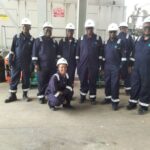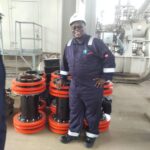As part of it effort to ensure smooth operations of its facilities, the West African Pipeline Company (WAPCo) Limited has launched off its scheduled offshore line maintenance programme in a major process that will guarantee the integrity of systems that channel natural gas from Nigeria and Ghana to the regional energy market.
Daily Champion which witnessed the flagging off the second phase of its pipeline maintenance, with pigging (cleaning) exercise, dispelled fear that the exercise would plunge Ghana, Togo, and Benin Republic into power Outage.
WAPCo along with its contractors loaded the first foam Pipeline Inspection Guage (PIG) into the line from its Lagos Beach Compressor Station at Badagry to mark the comprehensive pipeline cleaning, inspection and valve replacement maintenance activities.


The initial sludge mopping pig which would take estimated four days under carefully measured gas pressure to arrive Takoradi in Ghana will be followed by subsequent pigs, including the final intelligent pig that would assist in the pipeline wall inspection, corrosion check and integrity assessment required to guide possible repairs.
According to the General Manager in charge of Corporate Affairs at WAPCo, Dr Isaac Adjei Doku, the ongoing major maintenance activities cover the offshore section of the pipeline stretching from Badagry in Nigeria to Aboadze in Ghana. And it is follows the conclusion of the maintenance on the onshore section of the pipeline from Itoki to Badagry in Nigeria.
Scope of maintenance work to be undertaken during the period include cleaning the pipeline to remove debris, dirt, and liquids; inspecting the internal walls of the pipeline; replacing faulty subsea valves; and conducting any ancillary works needed.
Most of the activities would take place offshore and at WAPCo’s Lagos Beach Compressor Station located at Badagry, Lagos State, Nigeria; and at the Takoradi Regulating and Metering Station in Ghana.
The major maintenance activities which began on February 5, are expected to be completed by March 2, 2025. And within the period, gas transportation services from Nigeria to Cotonou in Benin Republic, Lomé in Togo, and Tema in Ghana will be temporary suspended. Also affected is the reverse flow transportation of natural gas from Ghana’s Western Region to Tema in the east of the country.
An average of about 85,000MMSCF/d of gas would be required to push the Pipeline, and the pig from Nigeria to Takoradi will entail that WAPCo would continue pushing existing volumes of gas in the pipleline in a linear direction to be discharged and utilized at Takoradi in Ghana where all the pigs introduced at Lagos are to be received.
The maintenance programme, according to Dr Doku, also provides the opportunity for the company to replace two undersea intersection valves at Cotonou in Benin Republic and Tema in Ghana. Previous maintenance inspections had indicated that the valves at the two intersections would necessarily be replaced.
Thus, two companies have been engaged by WAPCo to work with in-house technical team in handling the two aspects of the maintenance project. Whereas Topline is engaged in pigging, Hydrodive would stand by for the subsea valve replacements.
Ahead the maintenance exercise, the company had engaged the media and sundry stakeholders to promote public awareness on the project, ensure transparency and provide accurate information on how the activities would affect gas transportation services and offtakers along the supply route.
Dr Doku stated that the company had secured the approval of the governments of Nigeria, Benin, Togo and Ghana to embark on the scheduled exercise, adding that maximum demand offtakers including power producers and industrial consumers have encouraged to switch their plants to alternative fuel sources in order to avert possible downtimes.
General Manager in charge of Operations and Maintenance, Auwal Ibrahim, stated: “WAPCo is committed to maintaining the proactive stakeholder engagement processes established during the project’s preparation phase, during execution. The company will continue to engage with relevant stakeholders on all matters to ensure the project’s safe execution and success.”
He added that WAPCo would continue to engage relevant stakeholders during the process and provide regular updates throughout the period.
The company also said it has installed all necessary field equipment and incident response measures, including an effluent management system for the project.
Dr Doku who spoke to journalists in Lagos, Nigeria, explained that the maintenance project is routine and mandatory in compliance to strict technical and operating regulations stipulated for the regional player by the Abuja based West African Gas Pipeline Authority (WAGPA).
He said that WAGPA’s regulation requires WAPCo to clean and inspect the pipeline every five years; Adding that “the company last cleaned and inspected the pipeline about 5 years ago.”
Other reasons for the maintenance project, according to WAPCo, are to ensure safe reliable operations, align with industry best practices, and confirm the condition and integrity of the pipeline.
Dr Doku stated that the maintenance work would prioritize the safety of the workers and that “WAPCo has extensively engaged all relevant stakeholders to ensure a smooth and successful project.”He added that WAPCo’s engineering and safety teams have worked to develop a comprehensive plan to ensure that all activities are completed as safely and efficiently as possible.
He made it clear that “WAPCo anticipates only a minimal disruption to the activities of host communities within the vicinity of our facilities in Badagry, Nigeria and Aboadze, Ghana as most of our activities will be offshore and confined within the premises of our facilities.”
On environmental considerations, he said that “WAPCo has engaged the environmental protection agencies in the respective countries and has implemented a world class effluent management system at its facility in Takoradi where the company expects to receive some liquids and debris from the cleaning of the offshore pipeline.”

























